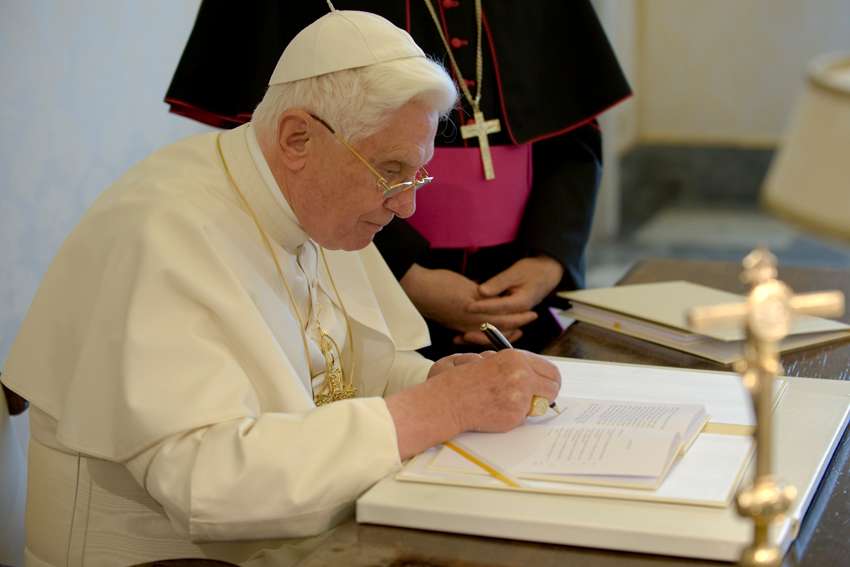Now that the Pope Emeritus has died and gone to his eternal dwelling place, his reflections take on a new poignance. We don’t know what eternity is like, he wrote in Spe Salvi. But we do know that it is not “an unending succession of days in the calendar,” an unappealing vision which “seems to be more of a curse than a gift.” Rather, “It would be like plunging into the ocean of infinite love, a moment in which time — the before and after — no longer exists.”
Hope in an eternity of love colours how we live in this world, but not in the sense that we should strive to tote up a long list of good actions to win a heavenly reward. Rather, it would seem, we should live as much as possible as though we were already in Heaven. In such a way, the world becomes transformed by the love of God. God’s “kingdom is present wherever He is loved and wherever His love reaches us.”
Pope Benedict was quick to point out, however, that our hope must be more than the quest for a better world. He applauded Karl Marx for his acute analysis of the need for radical social change. But the failure of Marxism is the belief that a worldly utopia is possible, that human sinfulness could be destroyed by the realization of a just economic system. As well, Marx was much better at analyzing what was wrong with society than in proposing a workable solution.
We will do better if we reach out for that which is infinitely beyond our grasp. We will not attain the unattainable, but by stepping beyond ourselves we might treat our fellow humans with greater kindness and love. Ultimately, people need God for without God, there is no hope.
As well, people have various hopes — for a career, for success, for a satisfying love life, etc. Such hope is not enough. “It becomes clear that only something infinite will suffice for him, something that will always be more than he can ever attain.”
Despite his theological brilliance, Pope Benedict felt no need nor any ability to tie up the loose ends of what this “something more” might be. Hope involves an assurance that we are bound for a destination beyond our current understanding combined with the belief God’s knowledge far outstrips human imaginings.
He was often seen as an ultra-conservative. Then, after the release of his encyclical on Catholic social teaching, Charity in Truth, some saw him as a social democrat. Such labels had no meaning for him. His thought and his life were rooted in a deep faith in Christ as our sole redeemer. Our lives on this side of paradise will always be incomplete, and we can only find completeness through the ongoing exercise of the theological virtues of faith, hope and love.
His lasting legacy will be one of humility. For despite his high profile during the past 60 years, he never sought anything for himself. He was the obedient servant of Jesus, always searching for and ready to obey God’s will.
This is where I find the challenge of Pope Benedict — not so much to agree with what he wrote but to live with a humility such as his. It seems impossible. Yet, Joseph Ratzinger was a man, not a god. He lived a life devoted to Jesus but was never so devout as to be disconnected from the world.
In the busyness of his life, he made time to be with Jesus, to meditate on the Gospel and to know his own poverty before God. It was not a superhuman task, but it was one built on gratitude and love. Elsewhere, he wrote that love is not a command but our grateful response to the love through which God draws near to us. If we can nurture such gratitude, we too can be humble as was the former pope who has gone before us in hope.
(Glen Argan writes his online column Epiphany at https://glenargan.substack.com.)


